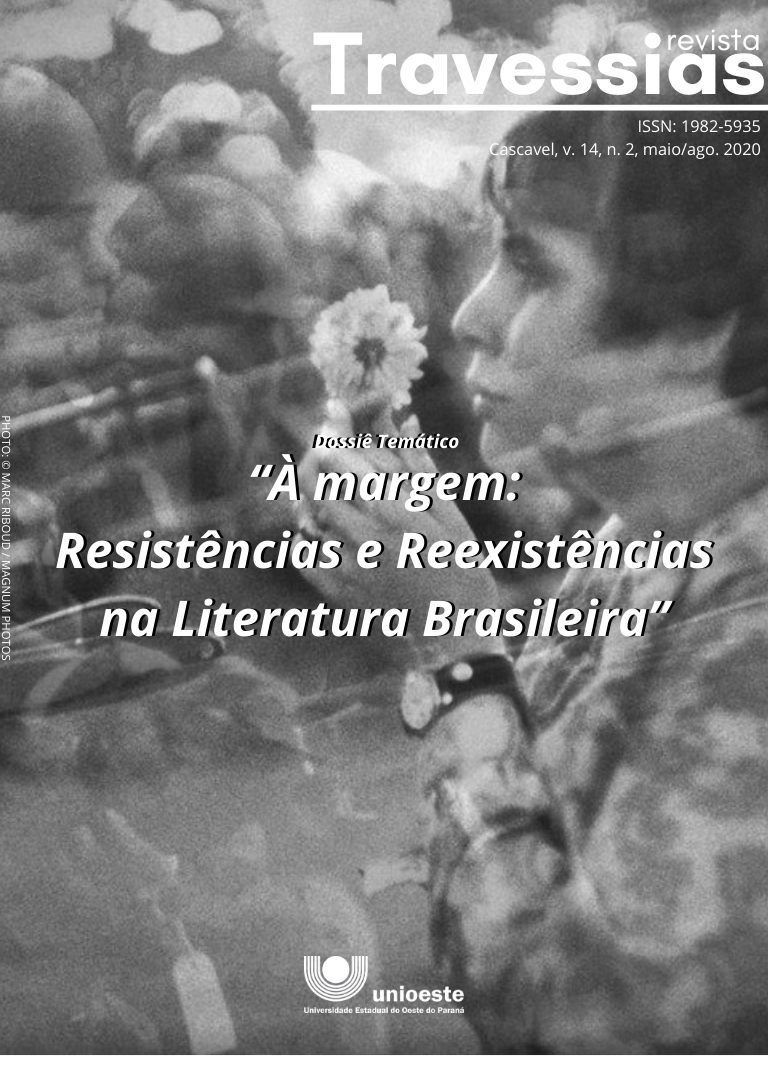The marginal in the formation of the reader
DOI:
https://doi.org/10.48075/rt.v14i2.24584Keywords:
Reader training, Marginal Literature, Minor Literature.Abstract
This article proposes to discuss the importance of Marginal Literature, which emerged from the 2000s, for the reading formation, aiming to establish the relationship between the production of these authors and the emergence of a movement that seeks its legitimation outside the canonical literary series. Therefore, thinking about the relationship between minority literatures and the practices and orientations that guide the formation of the reader is that this work seeks to problematize how the reading formation can, through works of Marginal Literature, promote an effective insertion of the so-called social groups Minority or marginalized in literacy practices and contribute to the linguistic development of the reader in training. The objective of this article is to evaluate how the Marginal Literature can contribute to a diversification and inclusion of peripheral cultural contents and themes in the practices of the reader's formation. It should be noted that not only the adoption of texts by authors linked to Marginal Literature (or other minority literatures) will solve any problem related to thematic diversity in the formation of the reader. However, if we want the present debate to initiate a reflection and possible re-signification of the practices and objectives that involve the formation of readers, from the adoption of varied literary manifestations, which are not even mentioned in the curricula.
Downloads
References
BATALHA, Maria Cristina. O que é uma Literatura Menor? Revista Cerrados, Brasília, v. 22, n. 35, p. 113-125, 2013.
BENEVENUTO, Silvana José. Literatura Marginal: a escrita como arma e instrumento de inserção cultural. In: ENCONTRO REGIONAL DE HISTÓRIA, XVIII, 2006, ANPUH/SP – UNESP/Assis. Anais... São Paulo, 24 a 28 de julho de 2006.
BLOOM, Harold. O cânone ocidental: os livros e a escola do tempo. Rio de Janeiro: Objetiva, 2010.
BRITTO, Luís Percival Leme. Escola, ensino de língua, letramento e conhecimento. Calidoscópio, Porto Alegre, vol. 5, n. 1, p. 24-30, jan./abr. 2007.
CANDAU, Vera Maria. Direitos humanos, educação e interculturalidade: as tensões entre igualdade e diferença. Revista Brasileira de Educação, v. 13, n. 37, p. 45-58, jan./abr. 2008.
DALCASTAGNÈ, Regina. Uma voz ao sol: representação e legitimidade na narrativa brasileira contemporânea. Estudos de Literatura Brasileira Contemporânea, Brasília, n. 20, p. 33-87, jul./ago. 2002.
DELEUZE, Gilles; GATTARI, Felix. Kafka: por uma literatura menor. Rio de Janeiro: Imago Editora, 1977.
FERRÉZ. Literatura marginal: talentos da escrita periférica. São Paulo: Agir, 2005.
FERRÉZ. Capão pecado. Rio de Janeiro: Objetiva, 2005a.
FREIRE, Paulo. A importância do ato de ler: em três artigos que se completam. São Paulo: Cortez, 1989.
HOLLANDA, Heloisa Buarque de. Literatura Marginal. Disponível em: <http://www.heloisabuarquedehollanda.com.br/literatura-marginal/> Acesso em: 16 jan., 2017.
JAUSS, Hans Robert. A história da literatura como provocação à teoria literária. São Paulo: Ática, 1994.
JESUS, Carolina Maria de. Quarto de despejo: diário de uma favelada. 10. ed. Rio de Janeiro: F. Alves, 1976.
KLEIMAN, Ângela Bustos. Oficina de leitura: teoria e prática. 9. ed. Campinas: Pontes, 2002.
LAJOLO, Marisa Philbert. Do mundo da leitura para a leitura do mundo. São Paulo: Ática, 1993.
LIMA, Vanessa Bastos; SEIDEL, Roberto Henrique. Literatura Marginal e Cultura da Periferia: uma análise da obra “Capão Pecado”, de Ferréz. Pontos de interrogação, Alagoinhas, vol. 1, n. 1, p. 142-157, jan./jun. 2011.
LINS, Paulo. Cidade de Deus. São Paulo: Companhia das Letras, 1997.
LOIS, Lena. Teoria e prática da formação do leitor: leitura e literatura na sala de aula. Porto Alegre: Penso, 2010.
OLIVEIRA, Ângelo Bruno Lucas de. Estética Da Recepção e Cânon. Cadernos do IL, Porto Alegre, n. 39, p. 115-120, dez. 2009.
OLIVEIRA, Rejane Pivetta de. Literatura marginal: questionamentos à teoria literária. Ipotesi, Juiz de Fora, v. 15, n. 2, p. 31-39, jul./dez. 2011.
REIS, Roberto. Cânon. In: JOBIM, José Luís (org.). Palavras da crítica. Rio de Janeiro: Imago, 1992.
SANTOMÉ, Jurjo T. As culturas negadas e silenciadas no currículo. In: SILVA, T. T. (Org.). Alienígenas na sala de aula: uma introdução aos estudos culturais em Identidade e diferença. Rio de Janeiro: Editora Vozes, 2000.
SCHWARZ, Roberto. SILVA, Tomaz Tadeu da. A produção social da identidade e da diferença. In. SILVA, Tomaz Tadeu da. Alienígenas na sala de aula: uma introdução aos estudos culturais em Identidade e diferença. Rio de Janeiro: Editora Vozes, 2000, p. 73-102.
VOGLER Bianca do Rocio; NETO, Miguel Sanches. O Manifesto Da Literatura Marginal: o texto “Terrorismo literário”, de Ferréz, e o poder de desvendamento do mundo e do movimento artístico da Literatura Periférica. Uniletras, Ponta Grossa, v. 35, n. 1, p. 83-93, jan./jun. 2013.
VOGT, Carlos. Trabalho/pobreza/trabalho intelectual. In. SCHWARZ, Roberto. Os pobres da literatura brasileira. São Paulo: Brasiliense, 1983.
Downloads
Published
How to Cite
Issue
Section
License
Creative Copyright Notice
Policy for Free Access Journals
Authors who publish in this journal agree to the following terms:
1. Authors keep the copyright and grant the journal the right of first publication, with the work simultaneously licensed under the Creative Commons Attribution License, which allows sharing the trial with acknowledgment of authorship and initial publication in this journal.
2. Authors are authorized to take additional contracts separately, for non-exclusive distribution of the work version, published in this journal (eg publish in institutional repository or as a book chapter), with acknowledgment of authorship and initial publication in this journal.
3. Authors are allowed and encouraged to publish and distribute their work online (eg in institutional repositories or on their personal page) at any point before or during the editorial process, as this can generate productive changes, as well as increase both impact and citation of the published trial (See The Effect of Free Access).
Creative Commons License
This work is licensed under a Creative Commons Attribution–NonCommercial-shareaswell 4.0 International License, which allows you to share, copy, distribute, display, reproduce, completely or part of the work, since there is no commercial purpose, and authors and source are cited.



